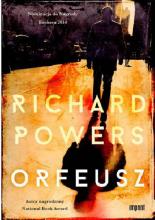
Orfeo
Orfeusz
Powers, currently Knight Professor of Creative Writing at Stanford University, was born on 18 June 1957 in Evanston. Early on, in the mid-1960s, his father, a high school principal with a working-class background, moved the family to the north Chicago suburb of Lincolnwood,. Powers then spent what he has frequently described as five “eye-opening” years in Thailand when his father accepted an appointment with the International School of Bangkok. Amid such dramatic relocations, the young Powers discovered the aesthetic sanctuary: he tapped into both a sustaining love of music (an accomplished student of vocal music, he trained in the cello but also plays guitar, clarinet, and saxophone) and a restless curiosity fed by voracious reading. He recounts the impact of both the Iliad and The Odyssey. As a teenager, he explored careers in paleontology, oceanography, and archaeology before ultimately choosing physics. In 1975, he enrolled as a physics major at the University of Illinois. Very soon, however, he changed to English/rhetoric when he realized, with some frustration, that the sciences demanded, even encouraged, an intolerable specialization. Powers completed his M.A. in late 1979. He elected not to pursue doctoral studies as he feared finding in literary theory and criticism the same limiting need to specialize. Powers moved to Boston in January 1980 and worked as a computer programmer and freelance data processor. Computer programmer by day, he continued his eclectic reading program. He lived near the Museum of Fine Arts, where he would spend Saturdays, and where, one week, he chanced upon an exhibit that included August Sander’s 1914 black-and-white photograph of three Westerwald farm boys heading, according to the title, to a dance. Within forty-eight hours he quit his job to devote himself to producing his first novel, Three Farmers on Their Way to a Dance, a project that took more than two years. That novel, which explores the tectonic impact of artistic images, met with significant critical success, much to Powers’s surprise. Encouraged by the realization that he could make a living from writing, Powers moved to southern Holland—in part to withdraw from the distractions of his initial success in the United States but more to immerse himself in that region’s fascinating play of multiple languages and dialects and to secure the distance necessary to finish the draft of his second novel, Prisoner’s Dilemma, an unsettling work that audaciously juxtaposed Disney and the logic of nuclear warfare, a novel that Powers has described as his most American work. While still in the Netherlands Powers completed his landmark work, The Gold Bug Variations, a dense and luminous story of love and death that intricately braids the metaphors of genetics, computer science, and polyphonic music. Two years after Gold Bug Powers published the much darker Operation Wandering Soul, which chronicled the slow-motion meltdown of a young resident-doctor confronting the harrowing realities of a pediatrics ward in a Los Angeles public hospital. Work on that manuscript was done during a yearlong stay in Cambridge and then completed when Powers returned stateside in 1992 to accept a position as writer-in-residence at the University of Illinois. Powers would use this academic experience to fashion Galatea 2.2, an ingenious retelling of the Pygmalion story using a bizarre university computer experiment in which an eccentric neurologist, assisted by a young, successful writer named Richard Powers, attempts to teach a computer network to respond to literature. In 1998 Powers published Gain, a disturbing narrative of an Illinois woman coming to terms at midlife with ovarian cancer most likely caused from the environmental carelessness of a nearby chemical plant. In his mesmerizing Plowing the Dark (2000), Powers chronicles both the grand efforts of a Seattle-based computer research team to produce the first self-contained virtual reality environment and the poignant narrative of an American teacher held hostage by Islamic fundamentalists in Beirut. His eighth novel, a sprawling generational study titled The Time of Our Singing (January 2003), comprises the properly ambitious themes of racial identity, the iterations of history, and the power of music. His The Echo Maker, exploring Capgras syndrome, won The National Book Award in 2006. Powers continues to write, teach, and travel.
In Orfeo, his most emotionally charged novel to date, inspired by the myth of Orpheus, Powers tells the story of a man journeying into his past as he desperately flees the present. Composer Peter Els opens the door one evening to find the police on his doorstep. His home microbiology lab—the latest experiment in his lifelong attempt to find music in surprising patterns—has aroused the suspicions of Homeland Security. Panicked by the raid, Els turns fugitive. As an Internet-fueled hysteria erupts, Els—the “Bioterrorist Bach”—pays a final visit to the people he loves, those who shaped his musical journey. Through the help of his ex-wife, his daughter, and his longtime collaborator, Els hatches a plan to turn this disastrous collision with the security state into a work of art that will reawaken its audience to the sounds all around them. The result is a novel that soars in spirit and language by a writer who “may be America’s most ambitious novelist” (Kevin Berger, San Francisco Chronicle).
“If Powers were an American writer of the nineteenth century…he’d probably be the Herman Melville of Moby-Dick. His picture is that big,” wrote Margaret Atwood (New York Review of Books).
Longlist for the 2014 National Book Award
Longlist for the 2014 Man Booker Prize